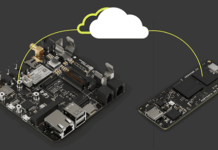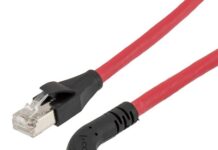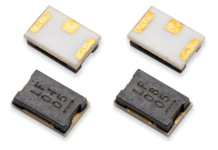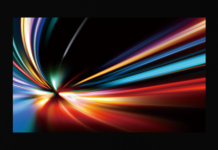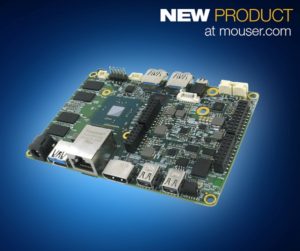
Mouser Electronics, Inc., the industry’s leading New Product Introduction (NPI) distributor with the widest selection of semiconductors and electronic components, is now offering the powerful X86 single-board computers from UDOO. The open source X86 combines the power of a PC with prototyping capabilities of the Arduino 101 and boasts 10 times faster execution time than the Raspberry Pi 3. With the X86, engineers can run a broad range of software, from gaming and video streaming to graphical editors and professional development platforms.
The UDOO X86 is now available from Mouser Electronics in four models — BASIC, ADVANCED, PLUS, and ULTRA — all of which are based on 64-bit quad-core Intel processors. UDOO X86 BASIC is based on an Intel Atom x5-E8000 processor with 2 GBytes of RAM. Both the X86 ADVANCED and ADVANCED PLUS run on an Intel Celeron N3160 processor with 4 GBytes of dual-channel RAM, while the most powerful model, UDOO X86 ULTRA, is based on an Intel Pentium N3710 with 8 GBtyes of dual-channel RAM and burst frequency up to 2.56 GHz. Both the ADVANCED PLUS and ULTRA models also include 32 GBtyes of eMMC storage, and all boards feature an M.2 Key B SSD Slot, M.2 Key E slot for Wi-Fi and Bluetooth 4.0 modules, SATA connector, and Gigabit Ethernet.
The X86 boards offers compatibility with any x86-compatible operating system — including Linux, Windows, or Android — as well as the Arduino 101 integrated development environment (IDE), shields, sketches, and libraries. The onboard Arduino-compatible platform is connected to the Intel processor through an internal USB port. Through this design, the Arduino 101-compatible microcontroller can run when the processor is powered off and wake it up when necessary, making the X86 ideal for Internet of Things (IoT) designs. For additional sensor functionality, engineers can add UDOO BRICKS to the UDOO X86. UDOO BRICKS work along a cascade configuration and can attach together via I2C connectors and cables using minimal space.
The X86 boards are ideal for prototyping applications requiring multimedia capabilities and high levels of parallel computing. The boards provide a flexible environment that lets engineers explore the IoT, build a media player powerful enough to drive three 4K displays, or create a retrogaming platform. The X86 boards are versatile enough for 3D scanning, robotics, gaming, streaming video, and computer vision applications.
To learn more, visit http://www.mouser.com/new/udoo/udoo-x86/.



